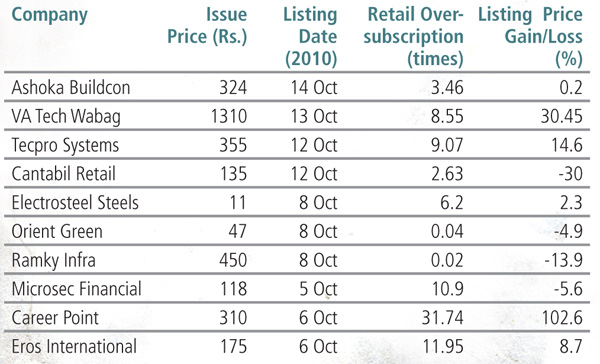
The IPO Attitude Problem
Companies are over-pricing IPOs to cash in on investors fast-in-fast-out strategy. The result is a loss for both
It is not usual for the capital market regulator to get involved with the everyday nitty-gritty of the market; especially when it has already laid out elaborate rules for market participants to go about their job. But SEBI’s suave and pushy chairman C.B. Bhave did exactly that in October. He admonished promoters of companies and their merchant bankers for pricing initial public offer (IPOs) of equity shares on the higher side. This, he said, did not leave anything on the table for investors.
There is immediate proof at hand to justify Bhave’s outburst. Of the 10 stocks listed in the exchanges in the first 10 days of October, investors lost money in four on the day of listing. Three more stocks have fallen below the issue in subsequent days of trading. In effect, investors have lost money seven times out of 10 in the period under study.
This is not a short-term phenomenon. The long-term averages are also not far behind. A recent study conducted by rating agency CARE showed that out of 116 IPOs that were issued between August 2007 and August 2010, 62 percent of the stocks are trading below their respective issue price. The question arises — does it make sense for investors to subscribe to new issues at all? Says Tirthankar Patnaik, strategist for institutional business, Religare Capital Markets: “There is a feeling among most investors that getting shares in an IPO allotment is a sure way to make gains.”
But the reason that investors are shying away from IPOs is that they are perceived to be not worth the price. The problem is that rather than relying on fundamentals of the company that is issuing the shares, they place their bets based on the demand for an issue by looking at data provided on the National Stock Exchange and Bombay Stock Exchange Web sites.
Analysts say that these investors subscribe to these IPOs only for short-term gains, as many of these stocks possibly don’t have sound fundamentals. Data on stock market Web sites show that top names like Goldman Sachs, Citigroup, Merrill Lynch and Credit Suisse have sold stakes from IPOs in Orient Green Power, Microsec and Indosolar soon after listing. Says Alok Kejriwal of KRIS Capital: “From the way investors are behaving it appears that there is not much upside left in the pricing of the recent IPOs.”
 Even CARE, India’a largest rating for IPOs, studies only the fundamental aspects of an issue but stays away from giving an opinion based on the offer price. There are many parameters that concern the issue price that is beyond the control of the rating agency. Rating agencies put out their report a few weeks before the issue is launched. However, as merchant bankers choose an appropriate time to flag off the IPO, market valuations could change dramatically.
Even CARE, India’a largest rating for IPOs, studies only the fundamental aspects of an issue but stays away from giving an opinion based on the offer price. There are many parameters that concern the issue price that is beyond the control of the rating agency. Rating agencies put out their report a few weeks before the issue is launched. However, as merchant bankers choose an appropriate time to flag off the IPO, market valuations could change dramatically. Patnaik says that it won’t be easy to pin the blame on any single market constituent for the current state of affairs. With even SEBI’s Bhave suggesting self regulation, there is no easy answer for the lay investor to make a decision to subscribe to an IPO. Along with companies’ self regulation, the only way out is to weigh the merits of the company before taking the plunge.
(This story appears in the 05 November, 2010 issue of Forbes India. To visit our Archives, click here.)















